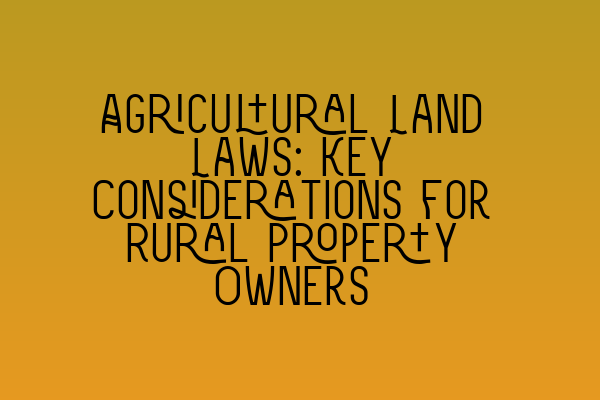Agricultural Land Laws: Key Considerations for Rural Property Owners
As a rural property owner, it is essential to have a comprehensive understanding of the agricultural land laws that govern your property. By familiarizing yourself with these key considerations, you can ensure compliance, protect your rights, and make informed decisions regarding the management and use of your land. In this blog post, we will delve into the intricacies of agricultural land laws, guiding you through the essentials.
1. Zoning and Land Use Regulations:
Zoning regulations are crucial when it comes to agricultural land. Each jurisdiction has its own set of rules, designating specific zones for agricultural activities. These regulations dictate what kind of farming activities are allowed, the construction of buildings or structures, water use, disposal of waste, and more. It is important to consult zoning maps and be aware of any restrictions, as non-compliance can lead to hefty fines or legal issues.
Key keywords: agricultural land laws, rural property owners, zoning regulations, land use regulations, farming activities, construction of buildings, water use, waste disposal, legal issues.
2. Environmental Protection and Conservation:
The sustainable use of agricultural land is of utmost importance in protecting the environment and preserving natural resources for future generations. Laws and regulations often require property owners to implement soil erosion control measures, manage water usage efficiently, minimize chemical runoff, and maintain buffers around water bodies. Compliance with these regulations not only safeguards the environment but also prevents legal liabilities.
Key keywords: sustainable use, agricultural land, environmental protection, conservation, soil erosion control, water usage, chemical runoff, legal liabilities.
3. Land Tenure and Ownership:
Understanding the nuances of land tenure and ownership is essential for rural property owners. Familiarize yourself with the different forms of land ownership, such as outright ownership, leasehold, or agricultural tenancies. Each type of ownership has its own legal implications, including inheritance rights, tax obligations, and restrictions on transferability. Seek legal advice to ensure your rights are protected and to navigate any complexities related to land tenure.
Key keywords: land tenure, land ownership, rural property owners, outright ownership, leasehold, agricultural tenancies, inheritance rights, tax obligations, transferability, legal advice.
4. Planning and Development:
If you have plans for development or altering the use of your agricultural land, it is essential to navigate the planning and development regulations in your jurisdiction. Generally, obtaining planning permissions and permits is a prerequisite for any substantial changes to your property, such as constructing additional buildings, expanding farming operations, or converting land for non-agricultural use. Failure to adhere to these regulations can result in significant setbacks and legal consequences.
Key keywords: planning and development, agricultural land, planning permissions, permits, substantial changes, constructing additional buildings, expanding farming operations, converting land, legal consequences.
5. Agricultural Subsidies and Grants:
Many governments offer subsidies and grants to support agricultural activities and encourage sustainable farming practices. These financial incentives can help alleviate the financial burden of operating a rural property. Stay informed about available programs, eligibility criteria, and application deadlines to make the most of these opportunities.
Key keywords: agricultural subsidies, grants, financial incentives, sustainable farming practices, rural property, available programs, eligibility criteria, application deadlines.
6. Dispute Resolution Mechanisms:
Despite best efforts, disputes may arise concerning agricultural land, whether it’s related to boundaries, access rights, nuisance claims, or contractual agreements. Understanding the dispute resolution mechanisms available to you, such as mediation or court litigation, can save time, money, and emotional stress. In many cases, seeking legal assistance from property law specialists can help you navigate these complex matters and find a satisfactory resolution.
Key keywords: dispute resolution mechanisms, agricultural land, boundaries, access rights, nuisance claims, contractual agreements, mediation, court litigation, property law specialists.
Conclusion:
Becoming well-versed in agricultural land laws is essential for rural property owners. By understanding zoning and land use regulations, environmental protection practices, land tenure, planning and development requirements, subsidies, and dispute resolution mechanisms, you can ensure compliance, minimize legal risks, and protect your rural property investment. Consulting with professional property law experts, like SQE Property Law & Land Law, can provide invaluable guidance and support throughout your journey as a rural property owner.
Remember, staying informed and proactive in understanding and complying with these agricultural land laws will not only benefit you but also contribute to the sustainability and success of your agricultural endeavors.
Key keywords: agricultural land laws, rural property owners, compliance, legal risks, property law experts, SQE Property Law & Land Law, sustainability, agricultural endeavors.
